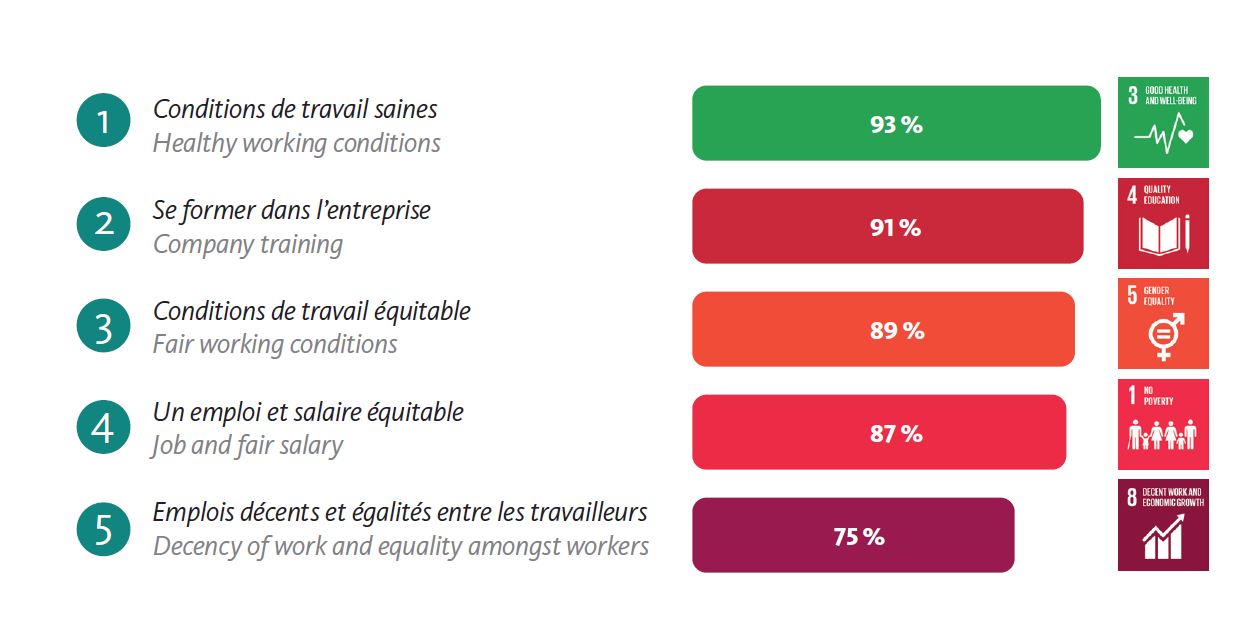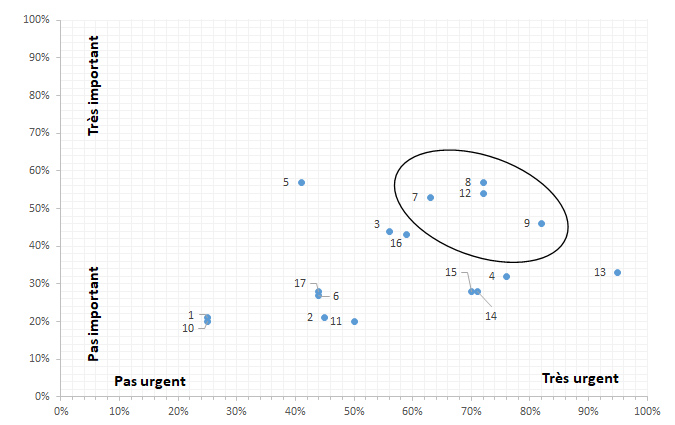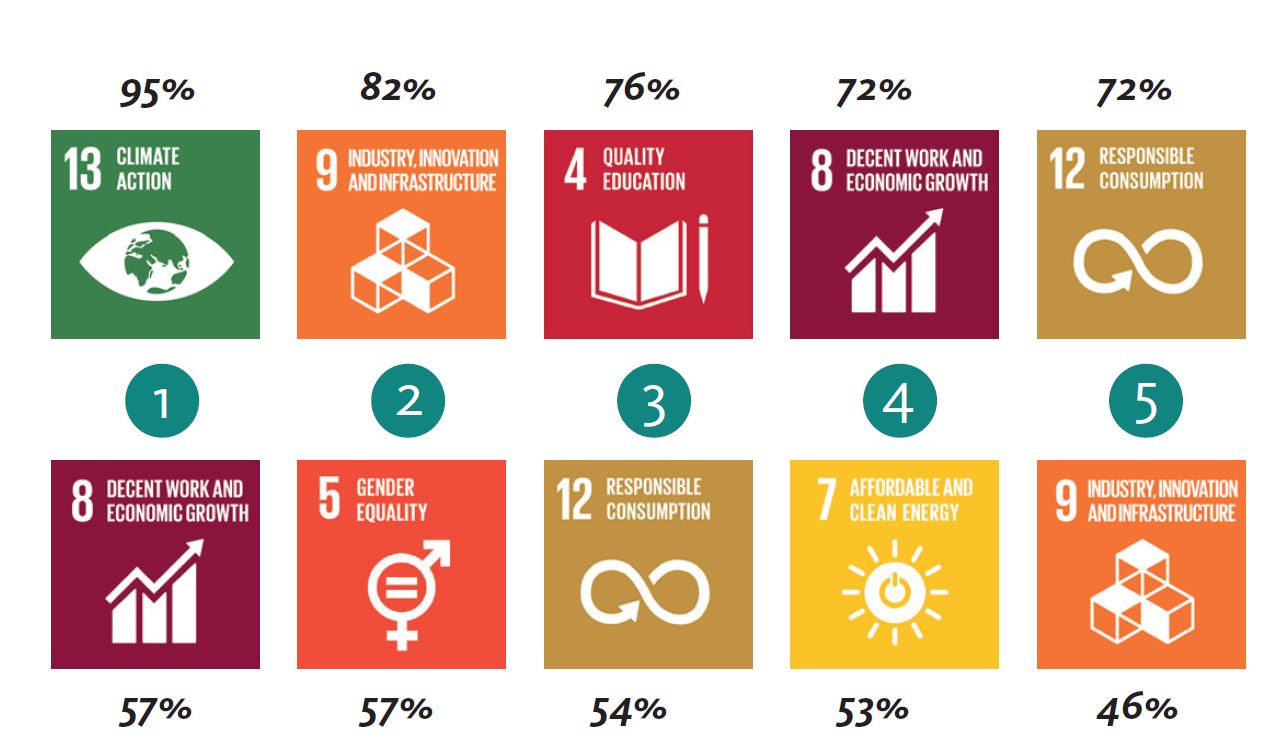Is Luxembourg on track to achieve the Sustainable Development Goals? Deeming corporations to be key actors in societal transformation, a survey was recently conducted among IMS Luxembourg members to gauge their level of involvement and commitment in the field of Corporate Social Responsibility (CSR), and more specifically to their potential contribution to the Luxembourg Agenda 2030.
Considered strategic by CEOs…
90% of CEOs consider CSR as a development opportunity for their business. Close to half of them (47%) sees it as an opportunity to respond to new market demands.
…CSR nonetheless lacks the resources necessary to manage its efficiency.
Only 60% of corporations have a dedicated CSR manager, who is fully devoted to the position in a meagre 13% of cases, and only 43% of surveyed businesses have allocated CSR budget. In terms of monitoring and controlling, a mere 46% declare having implemented short and medium-term CSR action plans, whilst 56% have developed specific key progress indicators.
Employees are at the heart of companies’ CSR framework…
Employees are the most involved stakeholder in companies’ CSR approach. Indeed, it can be noted that the three most consulted stakeholder groups are employees (71%), senior leadership (58%) and middle management (58%). Employees are informed of CSR news through meetings (76%), internal email communication (68%), intranet (65%) as well as training (41%).
…and their well-being is paramount.
One must note that the wellbeing of employees is a primary concern for respondents. As such, 89% of corporations have implemented measures aiming to increase wellbeing at work. These focus on improving health and safety (98%), office infrastructure (93%), work/life balance (90%), stress management (68%) and commutes (65%). Examining the link between the Sustainable Development Goals (SDGs) and companies’ CSR frameworks, five sub-goals align with employee well-being (see Figure 1). In particular, 93% of respondents mentioned healthy working conditions, 91% highlight the importance of continuous professional training and development, 89% address equitable working conditions, 87% equitable employment and remuneration, whilst 75% stress decent work and equality between workers. To further improve the well-being of their staff, 76% of companies would be willing to mutualise means and services with other organisations located close by.
Figure 1 - Top 5 priorities: employees at the centre of CSR plans
Each SDGs is characterized by several more specific sub-objectives. This figure emphasizes the five most recurrent sub-objectives in the CSR approach of respondents.
Figure 2 - CEOs’s opinion on the 17 Sustainable Development Goals
Vertical axis - % of respondents on strategical importance of SDGs for their company / Horizontal axis - % of respondents on SDGs’ level of emergency in the Luxembourg agenda.
How to read the matrix?
Respondants had to answer two questions :
1. On one hand, they had to assess on a 5 point Likert scale ranging from “not at all urgent” to “very urgent”, what SDGs should be treated as a priority in Luxembourg.
2. On the other hand, CEOs had to indicate the strategic importance of SGDs for their company.
Matrix had been built in order to show the relationship between the two dimensions. Intersections on matrix represents the percentage of respondents who indicated “urgent” or “very urgent” to the first question and the percentage of respondents who designated the SDG as “important” or “very important”. The associated number at each intersections symbolizes the ODD.
For instance, number “13” corresponds to the ODD called “Climate action” and is characterized by 95% of CEOs considering this ODD as an urgent issue to be handled by Luxembourg and 33% of CEOs who considers this one as important for the strategy of the company.
Toward new strategic issues?
IMS wanted to know CEOs’ opinion on the UN’s 17 SDGs. A matrix was created (see Figure 2) to highlight the SDGs’ ranking in terms of both strategic importance for the corporation, and urgency for the state.
In addition, it allows for the identification of tomorrow’s strategic issues, the SDGs that are perceived by CEOs to be both important for their core business, and an urgent priority for the Grand-Duchy (see black frame on the matrix). Corporations are considered to be key players in the achievement of these goals. The tighter the collaborating relationship between the private and public sectors, the greater the probability for success.
Figure 3 - 3.Strategic importance and urgency at state level :two different rankings
Above : The 5 ODDs that Luxembourg has to focus on
primarily. / Below : The 5 most strategic ODDs for companies.
SDG 8 promotes sustained, comprehensive and sustainable economic growth, full and productive employment and decent work for all. This goal underpins the Third Industrial Revolution which aims to achieve a sustainable, post-carbon and inclusive growth. Innovation is a crucial factor for the success of this SDG.
SDG 12 aims to ensure sustainable consumption and production patterns. As resources are increasingly depleted and the environment is degrading, new threats are emerging: shortages, cost volatility and environmental compensation constraints. This SDG thus represents a coherent risk-minimizing approach. It appears that the centripetal force of the circular economy has positively resonated with our respondents.
SDG 7 guarantees access to affordable, reliable, sustainable and modern energy for all. Companies’ contribution to this goal could increase renewable energy production, which in the current fossil fuel scarcity scenario would promote corporate resilience and protection against price volatility. The SDG also targets a two-fold multiplication of energy efficiency rates, which represents significant potential savings for businesses. Our respondents seem to have grasped the strategic value of this goal.
SDG 9 endeavours to ensure the building of resilient infrastructure, promoting inclusive and sustainable industrialization and fostering innovation. According the Global Compact France, this goal “can hope to be brought to life through the development of clean, eco-responsible, reliable and accessible infrastructure, which will underpin the economic development of tomorrow, human wellbeing and the promotion of a sustainable industrialization, which will benefit all and will favour access to ICT”. By encouraging innovation and accelerating R&D tied to these infrastructures, corporations will open their doors to comprehensive strategic opportunities: a leadership position in the transition to a sustainable industry, access to new markets and the anticipation of future regulations and costs.
CEOs nevertheless don’t fully grasp the strategic implications of the SDGs
Except for one goal, the percentage of CEOs who consider the achievement of SDGs as an urgency for the Luxembourg state remains greater than those who see it as a priority for their corporate strategy. (see figure 2) This shows a certain delay in the awareness of the strategic opportunities that the Development Goals durability could provide.
For example, SDG 13, which aims to urgently take action to counter climate change and its disastrous effects illustrates the most significant gap: 95% of CEOs agree that it is an urgent priority for Luxembourg, yet only 33% perceive it as important for their business strategy. In other words, 67% still falls short of assuming ownership of the strategic issues and major consequences of climate change on the sustainability of their economic model. Global Compact France states, that the costs of inaction, which would induce pronounced economic, social and environmental instability, is much greater than the investments required for climate adaptation and the decarbonisation of the economy.
As demonstrated in Nicolas Stern’s 2006 report, inaction in the face of global climate change amounts to annual global GDP losses of 5% to 20%, depending on the array of risks and consequences accounted for. On the other hand, the investment in the reduction of greenhouse gas emissions to avoid the worst consequences would cumulate to only 1% of global GDP annually.
Man = Woman?
The 5th United Nations Sustainable Development Goal is to achieve gender equality and to empower all women and girls. This goal is the only one which CEO perceive to be more important in their corporate strategy (57%) than in the state’s priorities (41%) (see Figure 2). Does this result indicate that Luxembourg successfully raised corporate awareness about gender equality? The Positive Actions programme established in the framework of the national plan for gender equality certainly helped. According to the 2016 report on the gender pay gap published by the World Economic Forum, Luxembourg currently ranks 34th out of 144 countries, climbing up 22 places in the last ten years.
The Social and Solidarity Economy, a new collaborative approach?
Since the enforcement of the December 12, 2016 law on the creation of societal impact companies (SIS) came into effect, the Social and Solidarity Economy (ESS) is officially recognized as an economic sector in Luxembourg, regrouping private organisations (cooperatives, not-for-profit organisations, foundations, etc.) seeking to reconcile economic performance with social equity. This new type of company caught the attention of IMS’ members, since 76% of them are willing to co-create innovative solutions with these new actors.
The themes that they are most interested in are youth and education (51%), work and professional insertion (37%), circular economy (34%), sustainable energy (26%), health and nutrition (23%), short circuits (17%) and the silver economy (9%).
According to these results it can be said that corporations focus primarily on the social aspect. What is your view of that?
These results don’t surprise me, and I would even add that I find them quite encouraging. Indeed, by privileging socially-oriented practices, businesses understand that they can better their competitiveness and attractiveness by satisfying their employees’ needs and expectations.
Such an approach usually implies several steps. The company first needs to communicate with its staff to understand their needs; they then need to invest in practices aiming to fulfil those expectations. The latter will affect employee behaviour, for example by decreasing absenteeism, increasing commitment and reducing turnover. By taking action in the social sphere, companies adopt practices that have positive impacts on both employee well-being and corporate performance.
In light of other studies led by TNS Ilres, how do you explain this concern businesses show for the well-being of their employees?
I am not an insider to this decision making process, but I see four different explanations. Firstly, increasing regulatory pressure in terms of health and safety at work. Then, the humanism of certain corporate leaders translated into respect for their employees as a base for the proper functioning of their businesses. CSR is then merged into daily corporate culture and promoted by decision-makers at all levels. Thirdly, one can imagine that the results of certain studies have had an impact: they show that in the long-term, employee well-being, motivation and economic performance are strongly interlinked. Such initiatives are thus in the interest of leaders, even though many haven’t yet tackled this challenge. Finally, shortages in qualified workforce and the expectations of the millennial generation are not leaving businesses much choice than to positively address the key question of employee well-being.
What is your opinion of the 4 SDGs identified as strategic and urgent that are highlighted in the matrix?
Luxembourg has seen progress in all these four areas. But is this progress adequate? How can our society transform lifestyles, and refashion products, production and services such that material and energy flows are proportionate to the biophysical carrying capacity in the region? Smarter technology is necessary but not sufficient. We need new partnerships (SDG 17) instead of the old emphasis on growth. New forms of collaboration will help to reframe how we value natural, social and financial capital, who is a stakeholder and how to co-create value. Fit for future through radical innovation will not only take reconfiguring entire value chains, but rethinking business models by transcending age-old boundaries between production and consumption. It will take engaging citizens in influencing, not just enduring their futures as consumers, through open innovation and crowd sourcing ideas for value co-creation and business models. This calls on CEOs to more proactively confront societal fragmentation (SDG 10), rather than just call for responsible consumption.
The data shows that corporations are more than ready to be active in the ESS. What does that mean to you?
The majors challenges we are facing today, whether climatic, digital or social, are provoking a heightened sense of awareness and concern with the societal stakes they induce. We need to better anticipate the economic, social, cultural and ecological needs of the future. Seeking suitable and innovative solutions, companies are increasingly turning to actors of the social economy (social enterprises): social innovation has always been the underpinning success factor in finding innovative solutions to emerging social and societal issues. By working together and coordinating efforts and experiences, these companies can successfully build an economy that embeds both social innovation and human value in its core business.
Survey Methodology
Data collection: IMS usual contact points and/or CEOs of the 110 corporate members of IMS received an online survey to be completed.
Response rate: 38 %
Collection period : between June 29th and September 4th, 2017.
The survey was conceived by IMS, TNS Ilres, Liser and the Ministry of Labour, Employment and the social and solidarity economy.
Survey Methodology
Data collection: IMS usual contact points and/or CEOs of the 110 corporate members of IMS received an online survey to be completed.
Response rate: 38 %
Collection period : between June 29th and September 4th, 2017.
The survey was conceived by IMS, TNS Ilres, Liser and the Ministry of Labour, Employment and the social and solidarity economy.











